| Srl | Item |
| 1 |
ID:
114834
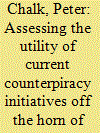

|
|
|
|
|
| Publication |
2012.
|
| Summary/Abstract |
This article examines the current international response to piracy and armed robbery off the Horn of Africa (HoA). It first describes the measures that are presently in place before going on to assess the relevance of these responses, both in terms of serving as a viable deterrent and in the context of addressing the root causes driving armed maritime crime in this part of the world. The article concludes by offering some tentative recommendations on how best to improve the regime of antipiracy in the HoA, focusing on capacity-building, the development of sub-regional maritime security arrangements, incentives to better engage the shipping industry in mitigation efforts and micro socioeconomic development projects in coastal regions of Somalia that support piracy.
|
|
|
|
|
|
|
|
|
|
|
|
|
|
|
|
| 2 |
ID:
114830
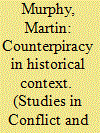

|
|
|
|
|
| Publication |
2012.
|
| Summary/Abstract |
This article identifies the salient lessons from three specific periods-the Graeco-Roman, Atlantic piracy and its extension into the Indian Ocean during the early Seventeenth Century, and piracy off China during the Ch'ing dynasty-that can most usefully inform the counter-piracy effort off Somalia. It makes the point that piracy's sinuous character has always given rise to conceptual and definitional difficulties; but that while law has had an important voice in piracy matters since Roman times it has never been the only voice. It suggests that modern pirate hunters, by treating piracy as akin to a domestic criminal activity, have shackled the effectiveness of violent suppression which their historical predecessors found so useful, while at the same time undervaluing the fundamental roles of politics and economics in piracy formation and the continuous struggle to make the seas safe for legitimate commerce.
|
|
|
|
|
|
|
|
|
|
|
|
|
|
|
|
| 3 |
ID:
114831
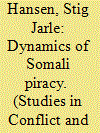

|
|
|
|
|
| Publication |
2012.
|
| Summary/Abstract |
By drawing upon information gathered from interviews with pirates as well as statistics this article explores the major traits of contemporary piracy in Somalia and the how they developed. Criminal maritime groups in the country have traditionally been the product of the actions and decisions of individual actors, although the current wave of activity is more the result of the weakening of political institutions. In all cases syndicates are driven by profit considerations and have largely shunned connections with political entities-although this latter factor appears to have changed since the end of 2010.
|
|
|
|
|
|
|
|
|
|
|
|
|
|
|
|
| 4 |
ID:
114835


|
|
|
|
|
| Publication |
2012.
|
| Summary/Abstract |
How does a sector consisting of a variety of owners cooperate to create effective anti-piracy tactics? This article describes how security strategies in the shipping industry have evolved, worked and what lessons need to be applied when formulating responses to future threat contingencies.
|
|
|
|
|
|
|
|
|
|
|
|
|
|
|
|
| 5 |
ID:
114836
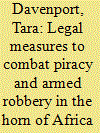

|
|
|
|
|
| Publication |
2012.
|
| Summary/Abstract |
Somalia and Southeast Asia have, at different times, been considered "hotspots" for piracy and armed robbery against ships. Some scholars have argued that comparisons between the two regions are pointless due to the different geopolitical factors that affect the respective regions and vastly different tactics used by Somali pirates and Southeast Asian pirates. Further, the differences in geopolitical considerations and tactics have meant that the legal measures used to respond to attacks in these regions have also greatly differed. The purpose of this article is to critically examine and evaluate the legal measures taken to facilitate the arrest, prosecution and punishment of pirates in Somalia and Southeast Asia. It concludes that while the legal measures employed by the relevant stakeholders differ in each region, valuable lessons can be learned on how States, regional organizations and international organizations can strengthen legal frameworks for the effective arrest and prosecution of perpetrators of piracy and armed robbery.
|
|
|
|
|
|
|
|
|
|
|
|
|
|
|
|
| 6 |
ID:
114832
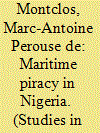

|
|
|
|
|
| Publication |
2012.
|
| Summary/Abstract |
Focused on maritime piracy in the oil-producing Niger Delta (Nigeria), this article addresses three main questions. First, how can we measure the escalation or decrease of criminal violence at sea? Secondly, what is the relationship between piracy and the (permanent) crisis of the state in Africa? Finally, what is the relationship between violence at sea and conflicts onshore? Actually, there are not enough data to monitor the real trend of maritime piracy in Nigeria. Another difficulty is that statistics and the international community focus on attacks against "big" commercial boats and the oil industry. As a result, they ignore "small" trawlers and fishermen who are the first victims of pirates in terms of homicides. Moreover, quantitative monitoring does not give details on the political economy of piracy. Too often, security analysts provide simplistic explanations that point to usual stereotypes on Africa: poverty, the failure of the state, etc. But the problem is more complex. The modernization of maritime piracy is different from a quantitative growth and has a lot to do with the local dynamics of political conflicts and crime in the oil-producing coastal states of Nigeria.
|
|
|
|
|
|
|
|
|
|
|
|
|
|
|
|
| 7 |
ID:
114833
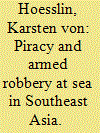

|
|
|
|
|
| Publication |
2012.
|
| Summary/Abstract |
Piracy and armed sea robbery in Southeast Asia remains very much alive and active despite its reduction in the international media spotlight since the dramatic proliferation of hijackings off the Horn of Africa. Although some littorol states have made significant successes in capturing and prosecuting pirates and gang robbers, the maritime crime continues to outpace law enforcement initiatives. Piracy and armed sea robbery in the region therefore remains highly fluid and dynamic. This article focuses specifically on piracy and armed robbery in the Singapore Strait as well as the southern South China Sea examining seasonal patterns, trends and modus operandi, as well as the criminal syndicates behind the incidents.
|
|
|
|
|
|
|
|
|
|
|
|
|
|
|
|
| 8 |
ID:
114829
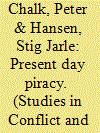

|
|
|
|
|
| Publication |
2012.
|
| Summary/Abstract |
Why has international piracy re-emerged as a threat to international shipping? The article introduces the factors that influence modern piracy, and explore the causes of it in more general terms. This introduction provides an overview of the scope and dimensions of modern-day piracy. It looks at problems of definition, statistics, location of attacks and main drivers. The article suggests that there is a limited set of geographical clusters that drive contemporary piracy, each of which require their own unique and separate national and international counter-measures.
|
|
|
|
|
|
|
|
|
|
|
|
|
|
|
|
| 9 |
ID:
114837
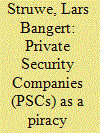

|
|
|
|
|
| Publication |
2012.
|
| Summary/Abstract |
Private Security Companies (PSC) are a part of the Best Management Practice in the shipping industry. The ship owners are using PSCs to protect their vessels against pirates, but protection of the vessels is just a part of the services that PSCs can provide. The services can be divided in four main groups: (1) security intelligence, risk assessment and consulting; (2) security services; (3) crisis response; and (4) intervention. While the use of PSCs may offer some deterrent value, the potential costs of hiring these firms would appear to outweigh the benefits. The argument in this article is that the use of PSCs works for the individual ship owners, but it is not a long term solution of the piracy problem unless they are used in a coordinated way by ship owners and the international society. In this way they can become an added value in the fight against piracy.
|
|
|
|
|
|
|
|
|
|
|
|
|
|
|
|